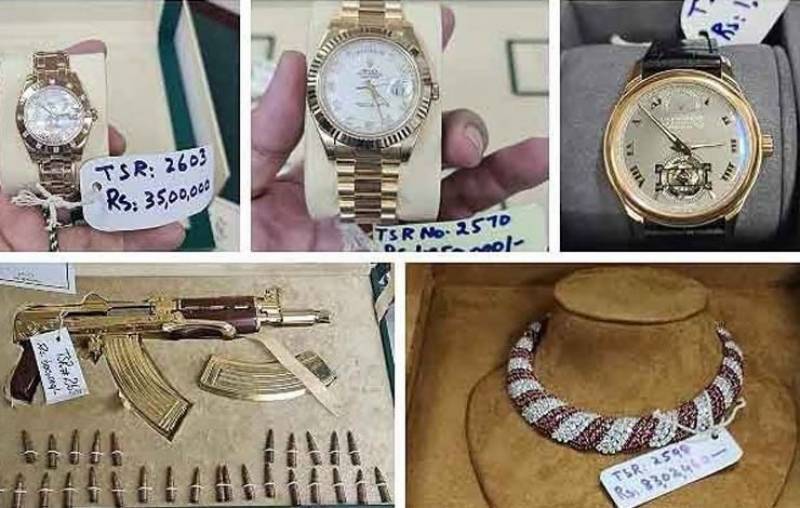
“When plunder becomes a way of life for a group of men in a society, over the course of time they create for themselves a legal system that authorizes it and a moral code that glorifies it” — Frédéric Bastiat
The proverb, iss hummam mein sab nange hain (all are naked in this communal bathhouse), is on the lips of every Pakistani today for our politicians, especially those who received state gifts from Toshakhana free of cost or at concessional rate, these were retained at 20 percent of the assessed value till 2009 and later at 50%, as per old and new rules.
The Federal Board of Revenue (FBR) must disclose to the people of Pakistan whether the beneficiaries of Toshakhana paid income tax on the gifts received free of cost or at concessional rates in their tax returns of the relevant period(s) or not. In case no income was offered on this account for tax as required under the Income Tax Ordinance, 2001, whether notices for its retrieval were issued or not.
In the event of public disclosure of record of Toshakhana by the Cabinet Division [2002-2023] on the order of Lahore High Court, ordinary Pakistanis have lost faith in the three pillars of state— legislature, judiciary and executive. They say that in the corridors of power, a vast majority is corrupt and, therefore, they do not speak against each other.
People say that those responsible for their accountability have utterly failed to perform their assigned duties under the supreme law of the land—the Constitution of Islamic Republic of Pakistan (“the Constitution”)—and laws/rules/regulations made thereunder. According to people in the streets, there would be no positive outcome in this matter as was the case in the past in various scandals and international leaks!
According to a Press report, the prominent personalities who benefited from the Toshakhana gifts include:
President Dr Arif Alvi, Prime Minister Shehbaz Sharif, former prime minister Imran Khan, ex-prime minister Nawaz Sharif, ex-president Asif Ali Zardari, late military dictator Pervez Musharraf, former premier Shaukat Aziz, ex-PM Yousuf Raza Gilani, ex-PM Shahid Khaqan Abbasi, ex-PM Raja Pervaiz Ashraf, ex-PM Zafarullah Khan Jamali, Senate Chairman Sadiq Sanjrani, Finance Minister Ishaq Dar, Foreign Minister Bilawal Bhutto-Zardari, Sheikh Rashid Ahmed, Khursheed Kasuri, Abdul Hafeez Shaikh, Jehangir Tarin, Shah Mehmood Qureshi, and Dr Attaur Rehman among others.
Read more here.
Among the Toshakhana beneficiaries is also the fourth-time federal finance minister of Pakistan, Muhammad Ishaq Dar, who as per details made public by the Cabinet Division, acquired (out of others) on March 24, 2014, a wrist watch, Vacheron Constantine, valued at Rs 660,000 for which he paid retention cost of Rs 130,000 as per prevalent rules. Since, he had also been in charge of FBR at that time and thereafter, one legitimately expects that he must have paid due income tax on the benefit of Rs 530,000 he derived as per Income Tax Ordinance, 2001 (the Ordinance).
Public officeholders, beneficiaries of state gifts, received mainly from outside Pakistan, fall under the head ‘Salary’ as per section 12 read with section 2(22)(c) of the Ordinance. The term “employment” is given wider meanings in the Ordinance vide section 2(22)(c) which includes: “the holding or acting in any public office”. In view of this legal position, any gift received free of cost or at concessional rate attracts the following provisions of the Ordinance in the hands of public officeholders:
Section 13(11) of the Income Tax Ordinance, 2001:
“Where, in a tax year, property is transferred or services are provided by an employer to an employee, the amount chargeable to tax to the employee under the head “Salary” for that year shall include the fair market value of the property or services determined at the time the property is transferred or the services are provided, as reduced by any payment made by the employee for the property or services”.
Section 68 of the Income Tax Ordinance, 2001 [relevant provisions]:
“68. Fair market value.– (1) For the purposes of this Ordinance, the fair market value of any property or rent, asset, service, benefit or perquisite at a particular time shall be the price which the property or rent, asset, service, benefit or perquisite would ordinarily fetch on sale or supply in the open market at that time.
(2) The fair market value of any property or rent, asset, service, benefit or perquisite shall be determined without regard to any restriction on transfer or to the fact that it is not otherwise convertible to cash.
(3) Where the price referred to in sub-section (1) is not ordinarily ascertainable, such price may be determined by the Commissioner”.
Acquisition of any gift from Toshakhana attracts the above provisions in the case of all public officeholders and employees of the governments (both federal and provincial) civilians as well as all who are part of the armed forces of Pakistan.
Read more.
The gifts received from Toshakhana by any public officeholder should be declared in the wealth statement of the tax year in which it is acquired free of cost or after paying the required amount of assessed value as per prescribed rules. Non-declaration attracts Article 62(1)(f) of the Constitution.
So far, only the Federal Minister for Planning, Development & Special Initiatives Ahsan Iqbal, through a letter has informed the Cabinet Secretary that he acquired three gifts at concessional value of Rs. 473,000 in 2018 as public officeholder, but has now paid the difference (assessed value and retention amount) of Rs 1,991,000 through a crossed cheque dated March 13, 2023. This is a praiseworthy act. However, the honourable minister should also pay tax on this amount to FBR, if it has not already paid in terms of provisions of the Income Tax Ordinance, 2001 cited above after revising his income tax returns. Hopefully, all other beneficiaries of state gifts will follow suit. In case of failure to do so, FBR is duty bound to proceed as per law.

